BABS - Evaluating the Contemporary Business Environment at Suffolk
VerifiedAdded on 2023/06/18
|13
|4225
|465
Essay
AI Summary
This essay provides a detailed analysis of the contemporary business environment in the UK, focusing on the economic impacts of the COVID-19 pandemic and Brexit. It examines the UK's economic slump during the pandemic, the government's economic responses such as VAT deferrals and salary contributions for disengaged employees, and the Bank of England's measures to support businesses. The essay also discusses the potential impacts of Brexit on the UK economy, including its effects on international trade and various industries. Furthermore, it references the University of Suffolk BABS assignment brief, ensuring alignment with the course requirements. Desklib provides similar solved assignments and study resources for students.

Contemporary business
environment
environment
Paraphrase This Document
Need a fresh take? Get an instant paraphrase of this document with our AI Paraphraser
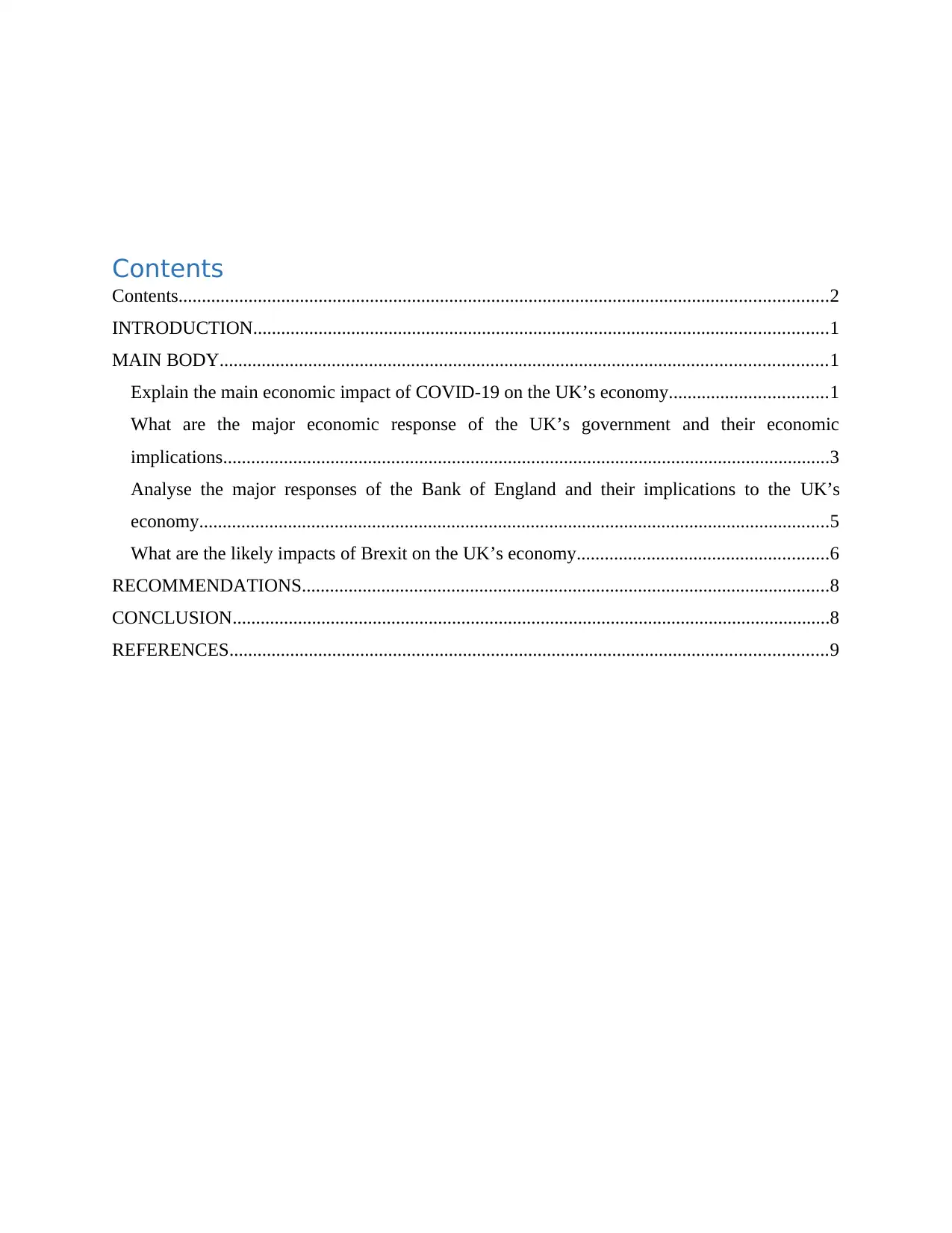
Contents
Contents...........................................................................................................................................2
INTRODUCTION...........................................................................................................................1
MAIN BODY..................................................................................................................................1
Explain the main economic impact of COVID-19 on the UK’s economy..................................1
What are the major economic response of the UK’s government and their economic
implications..................................................................................................................................3
Analyse the major responses of the Bank of England and their implications to the UK’s
economy.......................................................................................................................................5
What are the likely impacts of Brexit on the UK’s economy......................................................6
RECOMMENDATIONS.................................................................................................................8
CONCLUSION................................................................................................................................8
REFERENCES................................................................................................................................9
Contents...........................................................................................................................................2
INTRODUCTION...........................................................................................................................1
MAIN BODY..................................................................................................................................1
Explain the main economic impact of COVID-19 on the UK’s economy..................................1
What are the major economic response of the UK’s government and their economic
implications..................................................................................................................................3
Analyse the major responses of the Bank of England and their implications to the UK’s
economy.......................................................................................................................................5
What are the likely impacts of Brexit on the UK’s economy......................................................6
RECOMMENDATIONS.................................................................................................................8
CONCLUSION................................................................................................................................8
REFERENCES................................................................................................................................9

⊘ This is a preview!⊘
Do you want full access?
Subscribe today to unlock all pages.

Trusted by 1+ million students worldwide
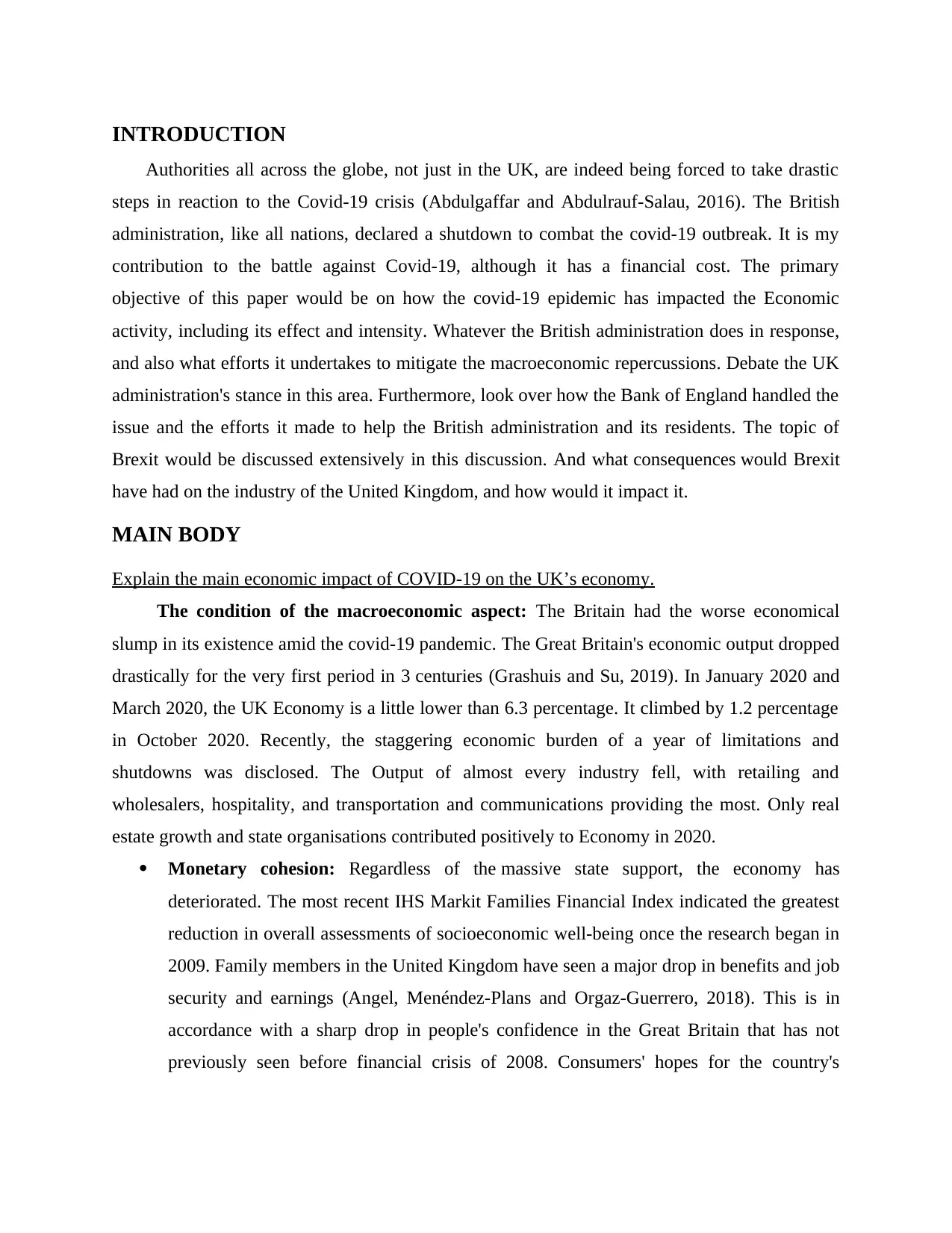
INTRODUCTION
Authorities all across the globe, not just in the UK, are indeed being forced to take drastic
steps in reaction to the Covid-19 crisis (Abdulgaffar and Abdulrauf-Salau, 2016). The British
administration, like all nations, declared a shutdown to combat the covid-19 outbreak. It is my
contribution to the battle against Covid-19, although it has a financial cost. The primary
objective of this paper would be on how the covid-19 epidemic has impacted the Economic
activity, including its effect and intensity. Whatever the British administration does in response,
and also what efforts it undertakes to mitigate the macroeconomic repercussions. Debate the UK
administration's stance in this area. Furthermore, look over how the Bank of England handled the
issue and the efforts it made to help the British administration and its residents. The topic of
Brexit would be discussed extensively in this discussion. And what consequences would Brexit
have had on the industry of the United Kingdom, and how would it impact it.
MAIN BODY
Explain the main economic impact of COVID-19 on the UK’s economy.
The condition of the macroeconomic aspect: The Britain had the worse economical
slump in its existence amid the covid-19 pandemic. The Great Britain's economic output dropped
drastically for the very first period in 3 centuries (Grashuis and Su, 2019). In January 2020 and
March 2020, the UK Economy is a little lower than 6.3 percentage. It climbed by 1.2 percentage
in October 2020. Recently, the staggering economic burden of a year of limitations and
shutdowns was disclosed. The Output of almost every industry fell, with retailing and
wholesalers, hospitality, and transportation and communications providing the most. Only real
estate growth and state organisations contributed positively to Economy in 2020.
Monetary cohesion: Regardless of the massive state support, the economy has
deteriorated. The most recent IHS Markit Families Financial Index indicated the greatest
reduction in overall assessments of socioeconomic well-being once the research began in
2009. Family members in the United Kingdom have seen a major drop in benefits and job
security and earnings (Angel, Menéndez-Plans and Orgaz-Guerrero, 2018). This is in
accordance with a sharp drop in people's confidence in the Great Britain that has not
previously seen before financial crisis of 2008. Consumers' hopes for the country's
Authorities all across the globe, not just in the UK, are indeed being forced to take drastic
steps in reaction to the Covid-19 crisis (Abdulgaffar and Abdulrauf-Salau, 2016). The British
administration, like all nations, declared a shutdown to combat the covid-19 outbreak. It is my
contribution to the battle against Covid-19, although it has a financial cost. The primary
objective of this paper would be on how the covid-19 epidemic has impacted the Economic
activity, including its effect and intensity. Whatever the British administration does in response,
and also what efforts it undertakes to mitigate the macroeconomic repercussions. Debate the UK
administration's stance in this area. Furthermore, look over how the Bank of England handled the
issue and the efforts it made to help the British administration and its residents. The topic of
Brexit would be discussed extensively in this discussion. And what consequences would Brexit
have had on the industry of the United Kingdom, and how would it impact it.
MAIN BODY
Explain the main economic impact of COVID-19 on the UK’s economy.
The condition of the macroeconomic aspect: The Britain had the worse economical
slump in its existence amid the covid-19 pandemic. The Great Britain's economic output dropped
drastically for the very first period in 3 centuries (Grashuis and Su, 2019). In January 2020 and
March 2020, the UK Economy is a little lower than 6.3 percentage. It climbed by 1.2 percentage
in October 2020. Recently, the staggering economic burden of a year of limitations and
shutdowns was disclosed. The Output of almost every industry fell, with retailing and
wholesalers, hospitality, and transportation and communications providing the most. Only real
estate growth and state organisations contributed positively to Economy in 2020.
Monetary cohesion: Regardless of the massive state support, the economy has
deteriorated. The most recent IHS Markit Families Financial Index indicated the greatest
reduction in overall assessments of socioeconomic well-being once the research began in
2009. Family members in the United Kingdom have seen a major drop in benefits and job
security and earnings (Angel, Menéndez-Plans and Orgaz-Guerrero, 2018). This is in
accordance with a sharp drop in people's confidence in the Great Britain that has not
previously seen before financial crisis of 2008. Consumers' hopes for the country's
Paraphrase This Document
Need a fresh take? Get an instant paraphrase of this document with our AI Paraphraser
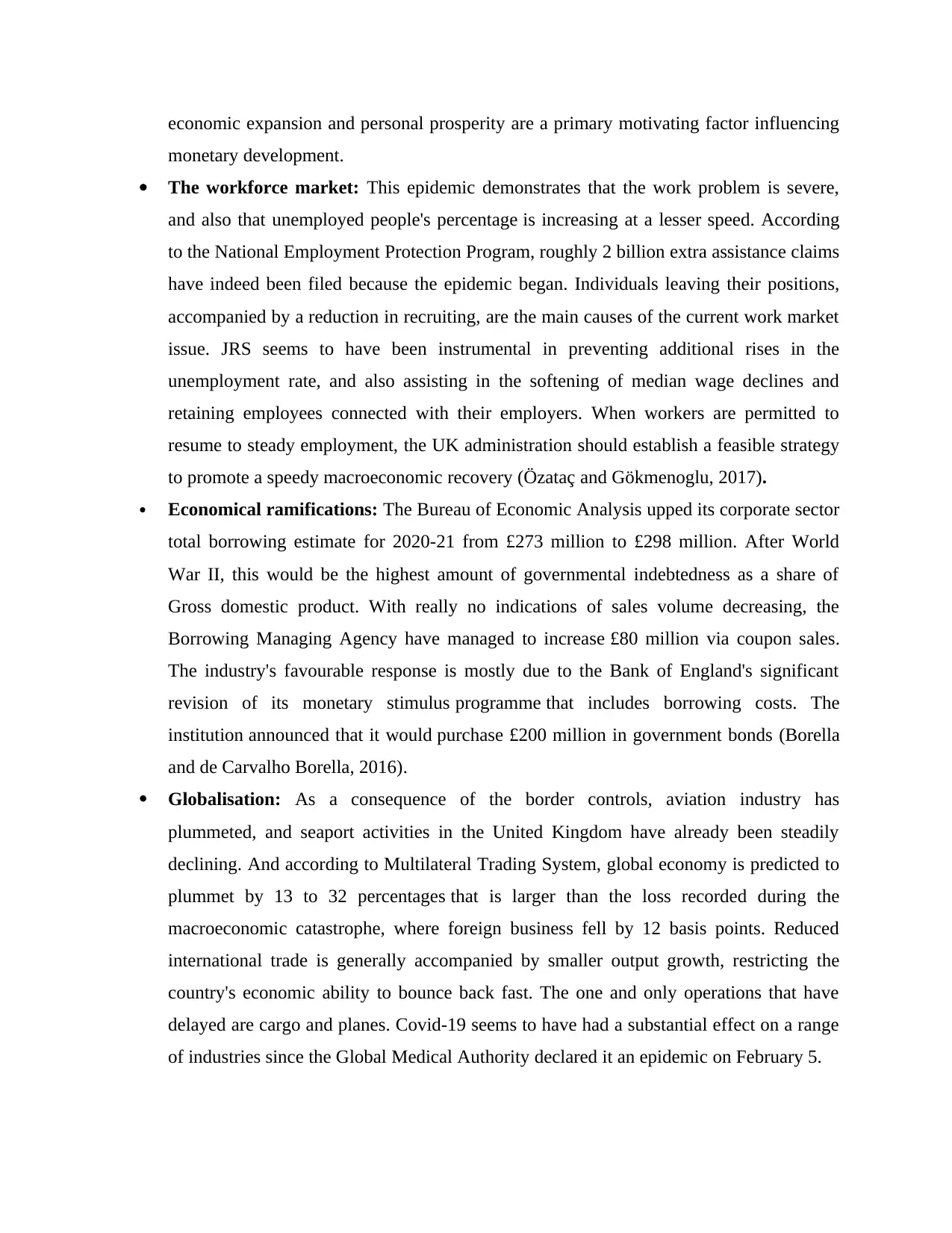
economic expansion and personal prosperity are a primary motivating factor influencing
monetary development.
The workforce market: This epidemic demonstrates that the work problem is severe,
and also that unemployed people's percentage is increasing at a lesser speed. According
to the National Employment Protection Program, roughly 2 billion extra assistance claims
have indeed been filed because the epidemic began. Individuals leaving their positions,
accompanied by a reduction in recruiting, are the main causes of the current work market
issue. JRS seems to have been instrumental in preventing additional rises in the
unemployment rate, and also assisting in the softening of median wage declines and
retaining employees connected with their employers. When workers are permitted to
resume to steady employment, the UK administration should establish a feasible strategy
to promote a speedy macroeconomic recovery (Özataç and Gökmenoglu, 2017).
Economical ramifications: The Bureau of Economic Analysis upped its corporate sector
total borrowing estimate for 2020-21 from £273 million to £298 million. After World
War II, this would be the highest amount of governmental indebtedness as a share of
Gross domestic product. With really no indications of sales volume decreasing, the
Borrowing Managing Agency have managed to increase £80 million via coupon sales.
The industry's favourable response is mostly due to the Bank of England's significant
revision of its monetary stimulus programme that includes borrowing costs. The
institution announced that it would purchase £200 million in government bonds (Borella
and de Carvalho Borella, 2016).
Globalisation: As a consequence of the border controls, aviation industry has
plummeted, and seaport activities in the United Kingdom have already been steadily
declining. And according to Multilateral Trading System, global economy is predicted to
plummet by 13 to 32 percentages that is larger than the loss recorded during the
macroeconomic catastrophe, where foreign business fell by 12 basis points. Reduced
international trade is generally accompanied by smaller output growth, restricting the
country's economic ability to bounce back fast. The one and only operations that have
delayed are cargo and planes. Covid-19 seems to have had a substantial effect on a range
of industries since the Global Medical Authority declared it an epidemic on February 5.
monetary development.
The workforce market: This epidemic demonstrates that the work problem is severe,
and also that unemployed people's percentage is increasing at a lesser speed. According
to the National Employment Protection Program, roughly 2 billion extra assistance claims
have indeed been filed because the epidemic began. Individuals leaving their positions,
accompanied by a reduction in recruiting, are the main causes of the current work market
issue. JRS seems to have been instrumental in preventing additional rises in the
unemployment rate, and also assisting in the softening of median wage declines and
retaining employees connected with their employers. When workers are permitted to
resume to steady employment, the UK administration should establish a feasible strategy
to promote a speedy macroeconomic recovery (Özataç and Gökmenoglu, 2017).
Economical ramifications: The Bureau of Economic Analysis upped its corporate sector
total borrowing estimate for 2020-21 from £273 million to £298 million. After World
War II, this would be the highest amount of governmental indebtedness as a share of
Gross domestic product. With really no indications of sales volume decreasing, the
Borrowing Managing Agency have managed to increase £80 million via coupon sales.
The industry's favourable response is mostly due to the Bank of England's significant
revision of its monetary stimulus programme that includes borrowing costs. The
institution announced that it would purchase £200 million in government bonds (Borella
and de Carvalho Borella, 2016).
Globalisation: As a consequence of the border controls, aviation industry has
plummeted, and seaport activities in the United Kingdom have already been steadily
declining. And according to Multilateral Trading System, global economy is predicted to
plummet by 13 to 32 percentages that is larger than the loss recorded during the
macroeconomic catastrophe, where foreign business fell by 12 basis points. Reduced
international trade is generally accompanied by smaller output growth, restricting the
country's economic ability to bounce back fast. The one and only operations that have
delayed are cargo and planes. Covid-19 seems to have had a substantial effect on a range
of industries since the Global Medical Authority declared it an epidemic on February 5.
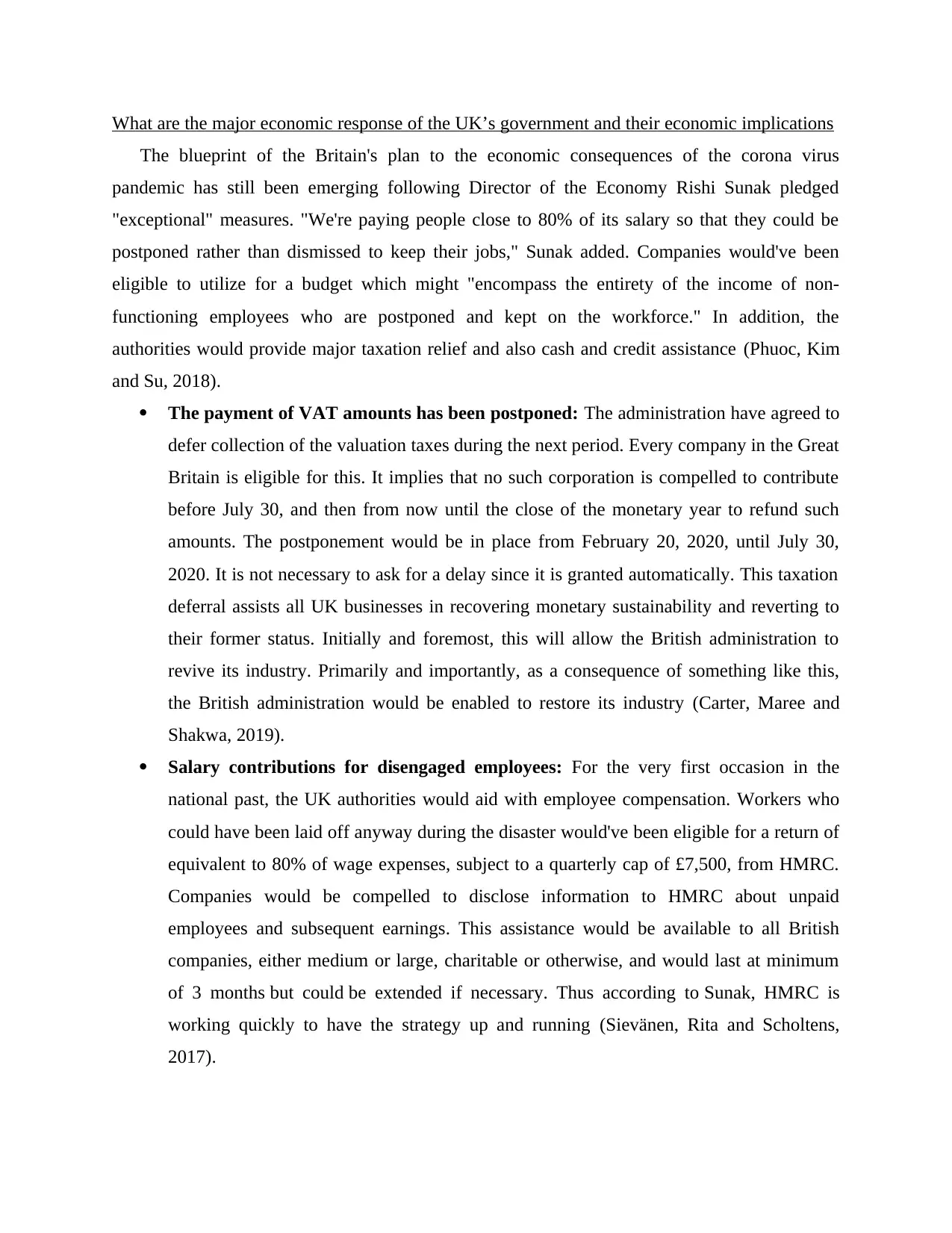
What are the major economic response of the UK’s government and their economic implications
The blueprint of the Britain's plan to the economic consequences of the corona virus
pandemic has still been emerging following Director of the Economy Rishi Sunak pledged
"exceptional" measures. "We're paying people close to 80% of its salary so that they could be
postponed rather than dismissed to keep their jobs," Sunak added. Companies would've been
eligible to utilize for a budget which might "encompass the entirety of the income of non-
functioning employees who are postponed and kept on the workforce." In addition, the
authorities would provide major taxation relief and also cash and credit assistance (Phuoc, Kim
and Su, 2018).
The payment of VAT amounts has been postponed: The administration have agreed to
defer collection of the valuation taxes during the next period. Every company in the Great
Britain is eligible for this. It implies that no such corporation is compelled to contribute
before July 30, and then from now until the close of the monetary year to refund such
amounts. The postponement would be in place from February 20, 2020, until July 30,
2020. It is not necessary to ask for a delay since it is granted automatically. This taxation
deferral assists all UK businesses in recovering monetary sustainability and reverting to
their former status. Initially and foremost, this will allow the British administration to
revive its industry. Primarily and importantly, as a consequence of something like this,
the British administration would be enabled to restore its industry (Carter, Maree and
Shakwa, 2019).
Salary contributions for disengaged employees: For the very first occasion in the
national past, the UK authorities would aid with employee compensation. Workers who
could have been laid off anyway during the disaster would've been eligible for a return of
equivalent to 80% of wage expenses, subject to a quarterly cap of £7,500, from HMRC.
Companies would be compelled to disclose information to HMRC about unpaid
employees and subsequent earnings. This assistance would be available to all British
companies, either medium or large, charitable or otherwise, and would last at minimum
of 3 months but could be extended if necessary. Thus according to Sunak, HMRC is
working quickly to have the strategy up and running (Sievänen, Rita and Scholtens,
2017).
The blueprint of the Britain's plan to the economic consequences of the corona virus
pandemic has still been emerging following Director of the Economy Rishi Sunak pledged
"exceptional" measures. "We're paying people close to 80% of its salary so that they could be
postponed rather than dismissed to keep their jobs," Sunak added. Companies would've been
eligible to utilize for a budget which might "encompass the entirety of the income of non-
functioning employees who are postponed and kept on the workforce." In addition, the
authorities would provide major taxation relief and also cash and credit assistance (Phuoc, Kim
and Su, 2018).
The payment of VAT amounts has been postponed: The administration have agreed to
defer collection of the valuation taxes during the next period. Every company in the Great
Britain is eligible for this. It implies that no such corporation is compelled to contribute
before July 30, and then from now until the close of the monetary year to refund such
amounts. The postponement would be in place from February 20, 2020, until July 30,
2020. It is not necessary to ask for a delay since it is granted automatically. This taxation
deferral assists all UK businesses in recovering monetary sustainability and reverting to
their former status. Initially and foremost, this will allow the British administration to
revive its industry. Primarily and importantly, as a consequence of something like this,
the British administration would be enabled to restore its industry (Carter, Maree and
Shakwa, 2019).
Salary contributions for disengaged employees: For the very first occasion in the
national past, the UK authorities would aid with employee compensation. Workers who
could have been laid off anyway during the disaster would've been eligible for a return of
equivalent to 80% of wage expenses, subject to a quarterly cap of £7,500, from HMRC.
Companies would be compelled to disclose information to HMRC about unpaid
employees and subsequent earnings. This assistance would be available to all British
companies, either medium or large, charitable or otherwise, and would last at minimum
of 3 months but could be extended if necessary. Thus according to Sunak, HMRC is
working quickly to have the strategy up and running (Sievänen, Rita and Scholtens,
2017).
⊘ This is a preview!⊘
Do you want full access?
Subscribe today to unlock all pages.

Trusted by 1+ million students worldwide
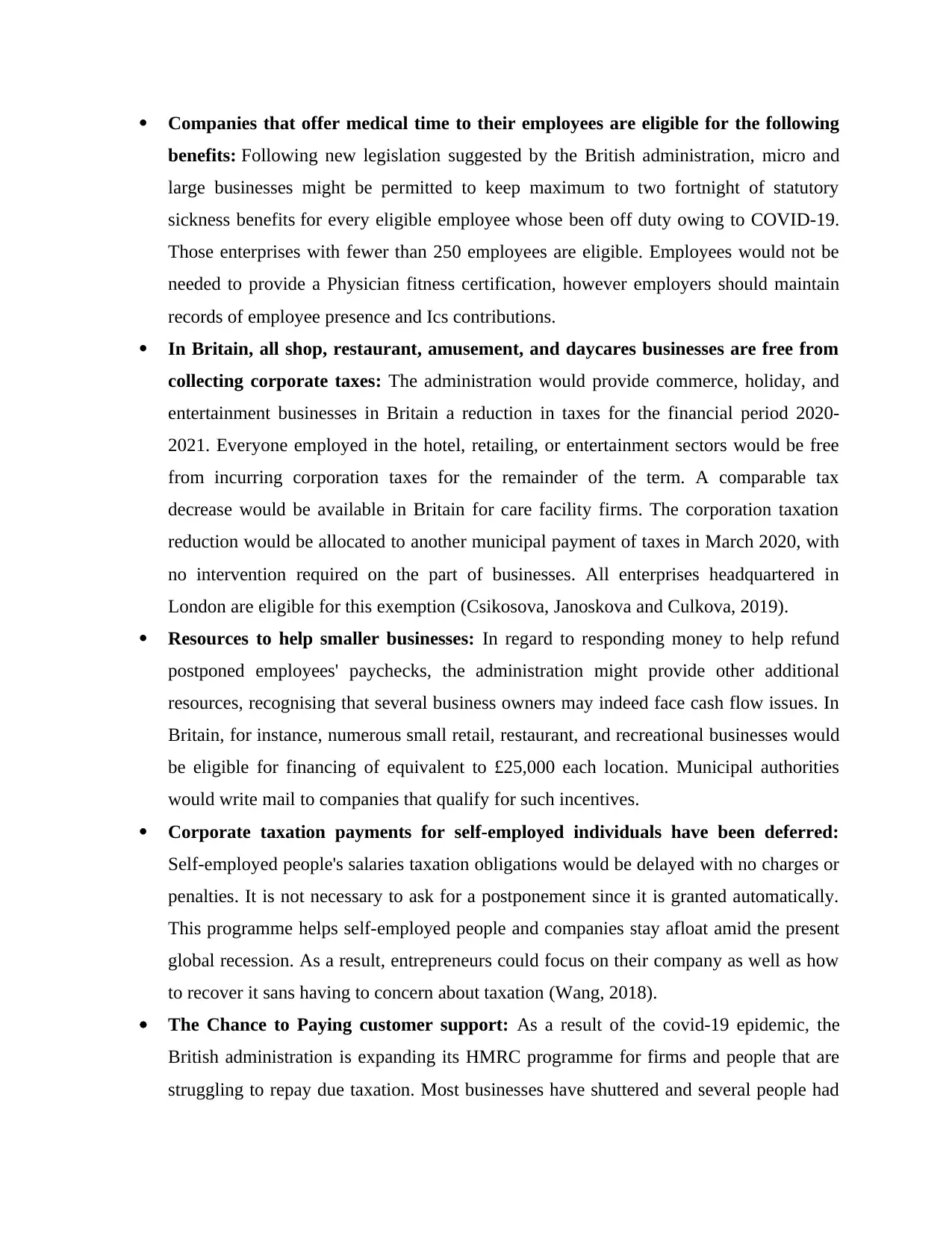
Companies that offer medical time to their employees are eligible for the following
benefits: Following new legislation suggested by the British administration, micro and
large businesses might be permitted to keep maximum to two fortnight of statutory
sickness benefits for every eligible employee whose been off duty owing to COVID-19.
Those enterprises with fewer than 250 employees are eligible. Employees would not be
needed to provide a Physician fitness certification, however employers should maintain
records of employee presence and Ics contributions.
In Britain, all shop, restaurant, amusement, and daycares businesses are free from
collecting corporate taxes: The administration would provide commerce, holiday, and
entertainment businesses in Britain a reduction in taxes for the financial period 2020-
2021. Everyone employed in the hotel, retailing, or entertainment sectors would be free
from incurring corporation taxes for the remainder of the term. A comparable tax
decrease would be available in Britain for care facility firms. The corporation taxation
reduction would be allocated to another municipal payment of taxes in March 2020, with
no intervention required on the part of businesses. All enterprises headquartered in
London are eligible for this exemption (Csikosova, Janoskova and Culkova, 2019).
Resources to help smaller businesses: In regard to responding money to help refund
postponed employees' paychecks, the administration might provide other additional
resources, recognising that several business owners may indeed face cash flow issues. In
Britain, for instance, numerous small retail, restaurant, and recreational businesses would
be eligible for financing of equivalent to £25,000 each location. Municipal authorities
would write mail to companies that qualify for such incentives.
Corporate taxation payments for self-employed individuals have been deferred:
Self-employed people's salaries taxation obligations would be delayed with no charges or
penalties. It is not necessary to ask for a postponement since it is granted automatically.
This programme helps self-employed people and companies stay afloat amid the present
global recession. As a result, entrepreneurs could focus on their company as well as how
to recover it sans having to concern about taxation (Wang, 2018).
The Chance to Paying customer support: As a result of the covid-19 epidemic, the
British administration is expanding its HMRC programme for firms and people that are
struggling to repay due taxation. Most businesses have shuttered and several people had
benefits: Following new legislation suggested by the British administration, micro and
large businesses might be permitted to keep maximum to two fortnight of statutory
sickness benefits for every eligible employee whose been off duty owing to COVID-19.
Those enterprises with fewer than 250 employees are eligible. Employees would not be
needed to provide a Physician fitness certification, however employers should maintain
records of employee presence and Ics contributions.
In Britain, all shop, restaurant, amusement, and daycares businesses are free from
collecting corporate taxes: The administration would provide commerce, holiday, and
entertainment businesses in Britain a reduction in taxes for the financial period 2020-
2021. Everyone employed in the hotel, retailing, or entertainment sectors would be free
from incurring corporation taxes for the remainder of the term. A comparable tax
decrease would be available in Britain for care facility firms. The corporation taxation
reduction would be allocated to another municipal payment of taxes in March 2020, with
no intervention required on the part of businesses. All enterprises headquartered in
London are eligible for this exemption (Csikosova, Janoskova and Culkova, 2019).
Resources to help smaller businesses: In regard to responding money to help refund
postponed employees' paychecks, the administration might provide other additional
resources, recognising that several business owners may indeed face cash flow issues. In
Britain, for instance, numerous small retail, restaurant, and recreational businesses would
be eligible for financing of equivalent to £25,000 each location. Municipal authorities
would write mail to companies that qualify for such incentives.
Corporate taxation payments for self-employed individuals have been deferred:
Self-employed people's salaries taxation obligations would be delayed with no charges or
penalties. It is not necessary to ask for a postponement since it is granted automatically.
This programme helps self-employed people and companies stay afloat amid the present
global recession. As a result, entrepreneurs could focus on their company as well as how
to recover it sans having to concern about taxation (Wang, 2018).
The Chance to Paying customer support: As a result of the covid-19 epidemic, the
British administration is expanding its HMRC programme for firms and people that are
struggling to repay due taxation. Most businesses have shuttered and several people had
Paraphrase This Document
Need a fresh take? Get an instant paraphrase of this document with our AI Paraphraser
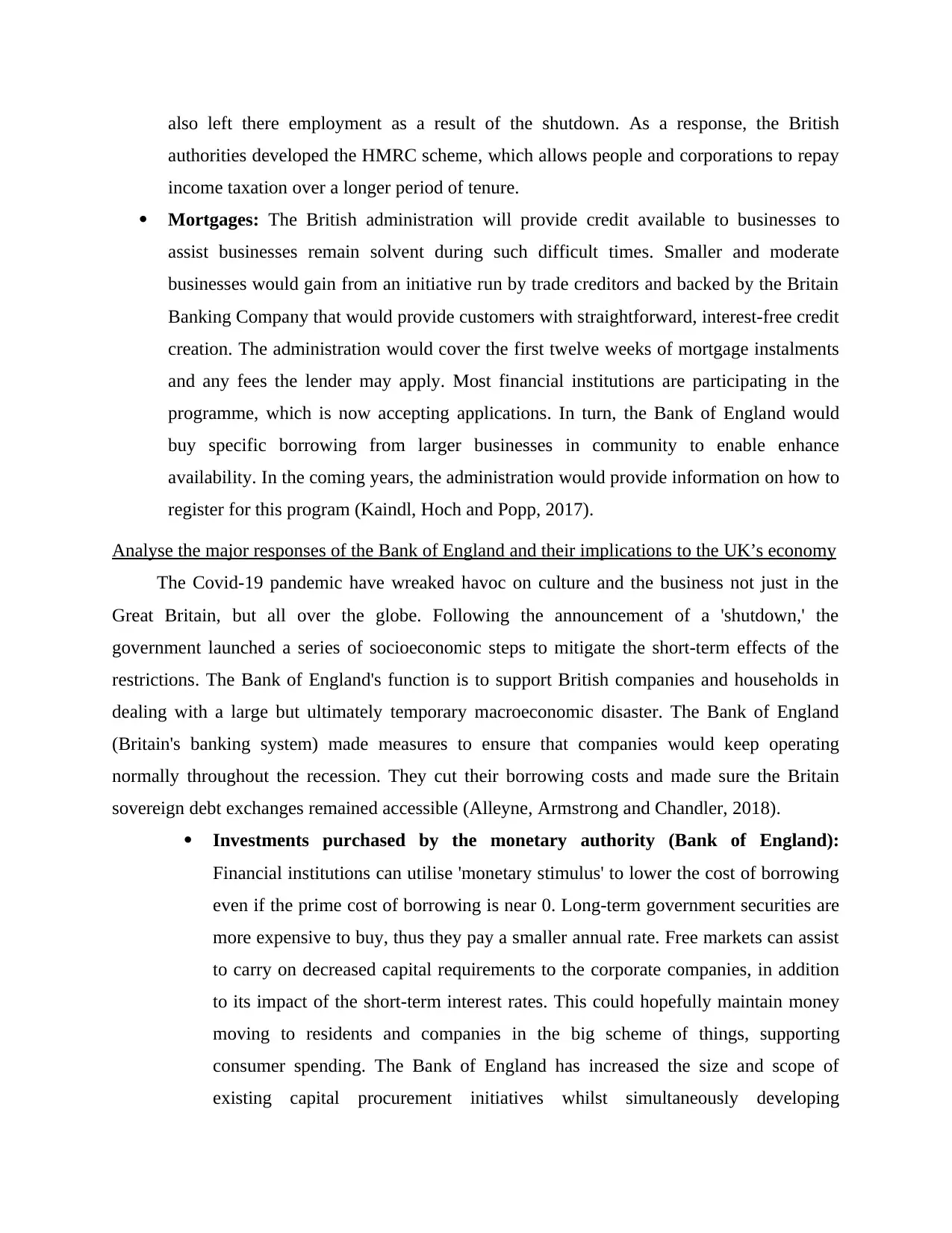
also left there employment as a result of the shutdown. As a response, the British
authorities developed the HMRC scheme, which allows people and corporations to repay
income taxation over a longer period of tenure.
Mortgages: The British administration will provide credit available to businesses to
assist businesses remain solvent during such difficult times. Smaller and moderate
businesses would gain from an initiative run by trade creditors and backed by the Britain
Banking Company that would provide customers with straightforward, interest-free credit
creation. The administration would cover the first twelve weeks of mortgage instalments
and any fees the lender may apply. Most financial institutions are participating in the
programme, which is now accepting applications. In turn, the Bank of England would
buy specific borrowing from larger businesses in community to enable enhance
availability. In the coming years, the administration would provide information on how to
register for this program (Kaindl, Hoch and Popp, 2017).
Analyse the major responses of the Bank of England and their implications to the UK’s economy
The Covid-19 pandemic have wreaked havoc on culture and the business not just in the
Great Britain, but all over the globe. Following the announcement of a 'shutdown,' the
government launched a series of socioeconomic steps to mitigate the short-term effects of the
restrictions. The Bank of England's function is to support British companies and households in
dealing with a large but ultimately temporary macroeconomic disaster. The Bank of England
(Britain's banking system) made measures to ensure that companies would keep operating
normally throughout the recession. They cut their borrowing costs and made sure the Britain
sovereign debt exchanges remained accessible (Alleyne, Armstrong and Chandler, 2018).
Investments purchased by the monetary authority (Bank of England):
Financial institutions can utilise 'monetary stimulus' to lower the cost of borrowing
even if the prime cost of borrowing is near 0. Long-term government securities are
more expensive to buy, thus they pay a smaller annual rate. Free markets can assist
to carry on decreased capital requirements to the corporate companies, in addition
to its impact of the short-term interest rates. This could hopefully maintain money
moving to residents and companies in the big scheme of things, supporting
consumer spending. The Bank of England has increased the size and scope of
existing capital procurement initiatives whilst simultaneously developing
authorities developed the HMRC scheme, which allows people and corporations to repay
income taxation over a longer period of tenure.
Mortgages: The British administration will provide credit available to businesses to
assist businesses remain solvent during such difficult times. Smaller and moderate
businesses would gain from an initiative run by trade creditors and backed by the Britain
Banking Company that would provide customers with straightforward, interest-free credit
creation. The administration would cover the first twelve weeks of mortgage instalments
and any fees the lender may apply. Most financial institutions are participating in the
programme, which is now accepting applications. In turn, the Bank of England would
buy specific borrowing from larger businesses in community to enable enhance
availability. In the coming years, the administration would provide information on how to
register for this program (Kaindl, Hoch and Popp, 2017).
Analyse the major responses of the Bank of England and their implications to the UK’s economy
The Covid-19 pandemic have wreaked havoc on culture and the business not just in the
Great Britain, but all over the globe. Following the announcement of a 'shutdown,' the
government launched a series of socioeconomic steps to mitigate the short-term effects of the
restrictions. The Bank of England's function is to support British companies and households in
dealing with a large but ultimately temporary macroeconomic disaster. The Bank of England
(Britain's banking system) made measures to ensure that companies would keep operating
normally throughout the recession. They cut their borrowing costs and made sure the Britain
sovereign debt exchanges remained accessible (Alleyne, Armstrong and Chandler, 2018).
Investments purchased by the monetary authority (Bank of England):
Financial institutions can utilise 'monetary stimulus' to lower the cost of borrowing
even if the prime cost of borrowing is near 0. Long-term government securities are
more expensive to buy, thus they pay a smaller annual rate. Free markets can assist
to carry on decreased capital requirements to the corporate companies, in addition
to its impact of the short-term interest rates. This could hopefully maintain money
moving to residents and companies in the big scheme of things, supporting
consumer spending. The Bank of England has increased the size and scope of
existing capital procurement initiatives whilst simultaneously developing
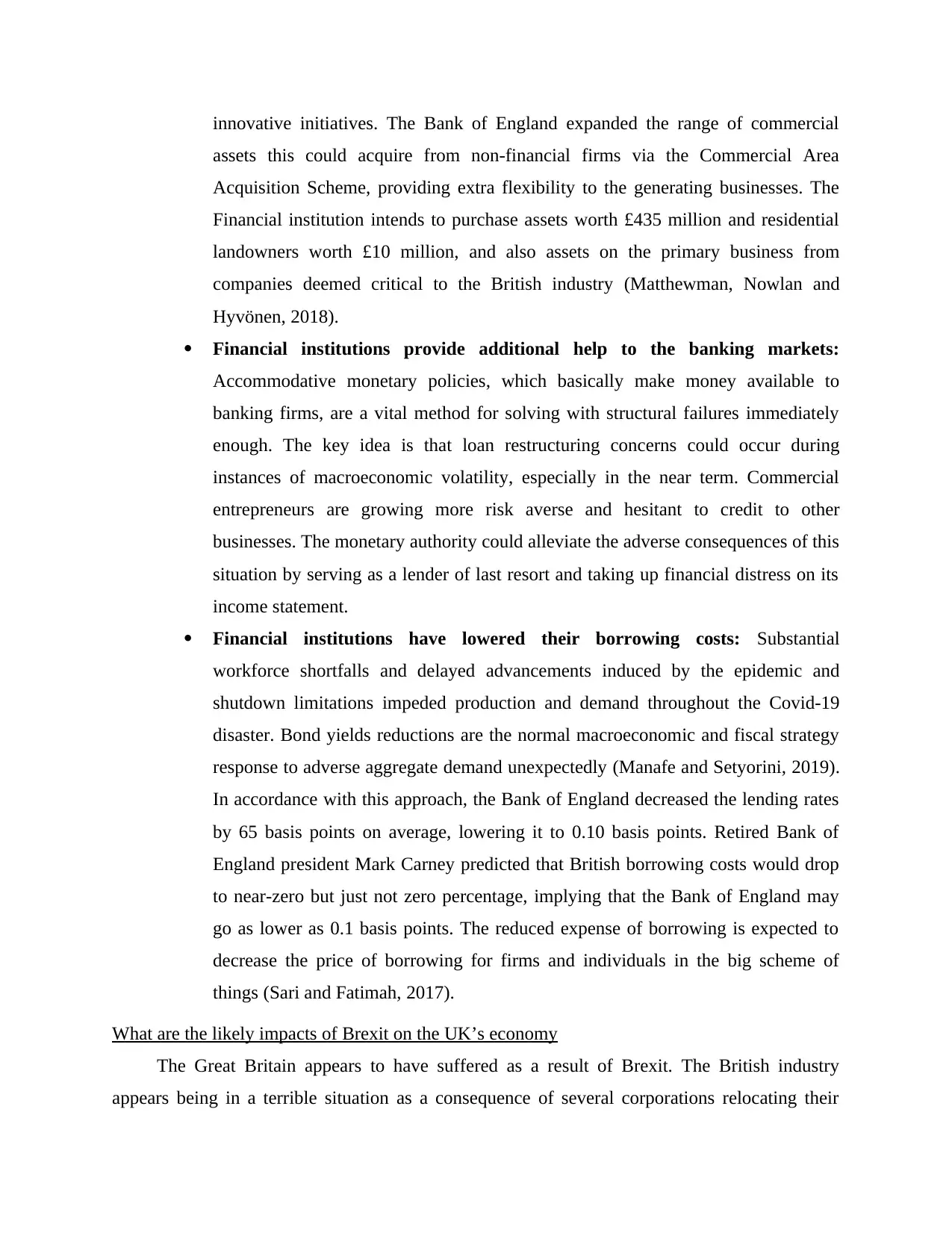
innovative initiatives. The Bank of England expanded the range of commercial
assets this could acquire from non-financial firms via the Commercial Area
Acquisition Scheme, providing extra flexibility to the generating businesses. The
Financial institution intends to purchase assets worth £435 million and residential
landowners worth £10 million, and also assets on the primary business from
companies deemed critical to the British industry (Matthewman, Nowlan and
Hyvönen, 2018).
Financial institutions provide additional help to the banking markets:
Accommodative monetary policies, which basically make money available to
banking firms, are a vital method for solving with structural failures immediately
enough. The key idea is that loan restructuring concerns could occur during
instances of macroeconomic volatility, especially in the near term. Commercial
entrepreneurs are growing more risk averse and hesitant to credit to other
businesses. The monetary authority could alleviate the adverse consequences of this
situation by serving as a lender of last resort and taking up financial distress on its
income statement.
Financial institutions have lowered their borrowing costs: Substantial
workforce shortfalls and delayed advancements induced by the epidemic and
shutdown limitations impeded production and demand throughout the Covid-19
disaster. Bond yields reductions are the normal macroeconomic and fiscal strategy
response to adverse aggregate demand unexpectedly (Manafe and Setyorini, 2019).
In accordance with this approach, the Bank of England decreased the lending rates
by 65 basis points on average, lowering it to 0.10 basis points. Retired Bank of
England president Mark Carney predicted that British borrowing costs would drop
to near-zero but just not zero percentage, implying that the Bank of England may
go as lower as 0.1 basis points. The reduced expense of borrowing is expected to
decrease the price of borrowing for firms and individuals in the big scheme of
things (Sari and Fatimah, 2017).
What are the likely impacts of Brexit on the UK’s economy
The Great Britain appears to have suffered as a result of Brexit. The British industry
appears being in a terrible situation as a consequence of several corporations relocating their
assets this could acquire from non-financial firms via the Commercial Area
Acquisition Scheme, providing extra flexibility to the generating businesses. The
Financial institution intends to purchase assets worth £435 million and residential
landowners worth £10 million, and also assets on the primary business from
companies deemed critical to the British industry (Matthewman, Nowlan and
Hyvönen, 2018).
Financial institutions provide additional help to the banking markets:
Accommodative monetary policies, which basically make money available to
banking firms, are a vital method for solving with structural failures immediately
enough. The key idea is that loan restructuring concerns could occur during
instances of macroeconomic volatility, especially in the near term. Commercial
entrepreneurs are growing more risk averse and hesitant to credit to other
businesses. The monetary authority could alleviate the adverse consequences of this
situation by serving as a lender of last resort and taking up financial distress on its
income statement.
Financial institutions have lowered their borrowing costs: Substantial
workforce shortfalls and delayed advancements induced by the epidemic and
shutdown limitations impeded production and demand throughout the Covid-19
disaster. Bond yields reductions are the normal macroeconomic and fiscal strategy
response to adverse aggregate demand unexpectedly (Manafe and Setyorini, 2019).
In accordance with this approach, the Bank of England decreased the lending rates
by 65 basis points on average, lowering it to 0.10 basis points. Retired Bank of
England president Mark Carney predicted that British borrowing costs would drop
to near-zero but just not zero percentage, implying that the Bank of England may
go as lower as 0.1 basis points. The reduced expense of borrowing is expected to
decrease the price of borrowing for firms and individuals in the big scheme of
things (Sari and Fatimah, 2017).
What are the likely impacts of Brexit on the UK’s economy
The Great Britain appears to have suffered as a result of Brexit. The British industry
appears being in a terrible situation as a consequence of several corporations relocating their
⊘ This is a preview!⊘
Do you want full access?
Subscribe today to unlock all pages.

Trusted by 1+ million students worldwide
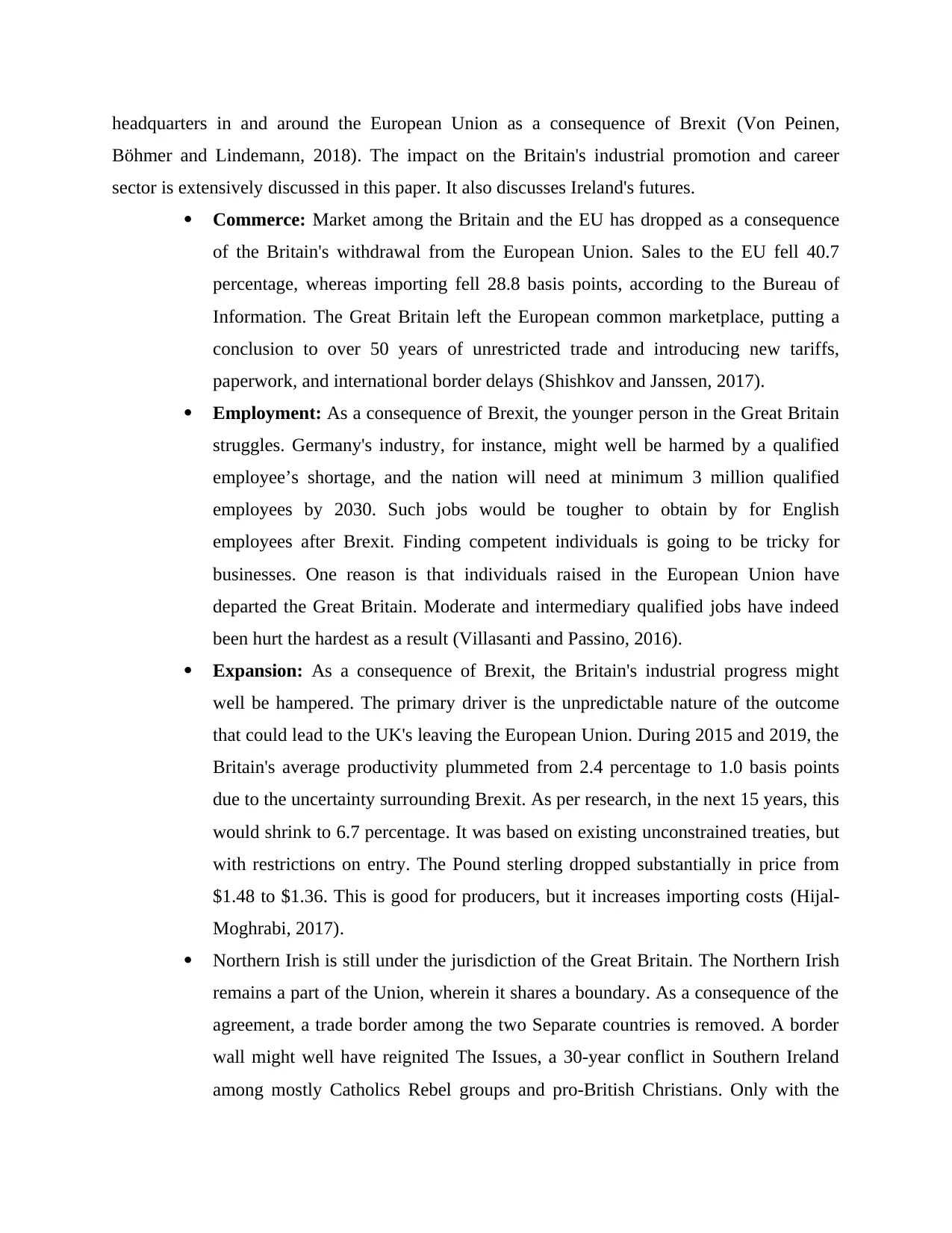
headquarters in and around the European Union as a consequence of Brexit (Von Peinen,
Böhmer and Lindemann, 2018). The impact on the Britain's industrial promotion and career
sector is extensively discussed in this paper. It also discusses Ireland's futures.
Commerce: Market among the Britain and the EU has dropped as a consequence
of the Britain's withdrawal from the European Union. Sales to the EU fell 40.7
percentage, whereas importing fell 28.8 basis points, according to the Bureau of
Information. The Great Britain left the European common marketplace, putting a
conclusion to over 50 years of unrestricted trade and introducing new tariffs,
paperwork, and international border delays (Shishkov and Janssen, 2017).
Employment: As a consequence of Brexit, the younger person in the Great Britain
struggles. Germany's industry, for instance, might well be harmed by a qualified
employee’s shortage, and the nation will need at minimum 3 million qualified
employees by 2030. Such jobs would be tougher to obtain by for English
employees after Brexit. Finding competent individuals is going to be tricky for
businesses. One reason is that individuals raised in the European Union have
departed the Great Britain. Moderate and intermediary qualified jobs have indeed
been hurt the hardest as a result (Villasanti and Passino, 2016).
Expansion: As a consequence of Brexit, the Britain's industrial progress might
well be hampered. The primary driver is the unpredictable nature of the outcome
that could lead to the UK's leaving the European Union. During 2015 and 2019, the
Britain's average productivity plummeted from 2.4 percentage to 1.0 basis points
due to the uncertainty surrounding Brexit. As per research, in the next 15 years, this
would shrink to 6.7 percentage. It was based on existing unconstrained treaties, but
with restrictions on entry. The Pound sterling dropped substantially in price from
$1.48 to $1.36. This is good for producers, but it increases importing costs (Hijal-
Moghrabi, 2017).
Northern Irish is still under the jurisdiction of the Great Britain. The Northern Irish
remains a part of the Union, wherein it shares a boundary. As a consequence of the
agreement, a trade border among the two Separate countries is removed. A border
wall might well have reignited The Issues, a 30-year conflict in Southern Ireland
among mostly Catholics Rebel groups and pro-British Christians. Only with the
Böhmer and Lindemann, 2018). The impact on the Britain's industrial promotion and career
sector is extensively discussed in this paper. It also discusses Ireland's futures.
Commerce: Market among the Britain and the EU has dropped as a consequence
of the Britain's withdrawal from the European Union. Sales to the EU fell 40.7
percentage, whereas importing fell 28.8 basis points, according to the Bureau of
Information. The Great Britain left the European common marketplace, putting a
conclusion to over 50 years of unrestricted trade and introducing new tariffs,
paperwork, and international border delays (Shishkov and Janssen, 2017).
Employment: As a consequence of Brexit, the younger person in the Great Britain
struggles. Germany's industry, for instance, might well be harmed by a qualified
employee’s shortage, and the nation will need at minimum 3 million qualified
employees by 2030. Such jobs would be tougher to obtain by for English
employees after Brexit. Finding competent individuals is going to be tricky for
businesses. One reason is that individuals raised in the European Union have
departed the Great Britain. Moderate and intermediary qualified jobs have indeed
been hurt the hardest as a result (Villasanti and Passino, 2016).
Expansion: As a consequence of Brexit, the Britain's industrial progress might
well be hampered. The primary driver is the unpredictable nature of the outcome
that could lead to the UK's leaving the European Union. During 2015 and 2019, the
Britain's average productivity plummeted from 2.4 percentage to 1.0 basis points
due to the uncertainty surrounding Brexit. As per research, in the next 15 years, this
would shrink to 6.7 percentage. It was based on existing unconstrained treaties, but
with restrictions on entry. The Pound sterling dropped substantially in price from
$1.48 to $1.36. This is good for producers, but it increases importing costs (Hijal-
Moghrabi, 2017).
Northern Irish is still under the jurisdiction of the Great Britain. The Northern Irish
remains a part of the Union, wherein it shares a boundary. As a consequence of the
agreement, a trade border among the two Separate countries is removed. A border
wall might well have reignited The Issues, a 30-year conflict in Southern Ireland
among mostly Catholics Rebel groups and pro-British Christians. Only with the
Paraphrase This Document
Need a fresh take? Get an instant paraphrase of this document with our AI Paraphraser
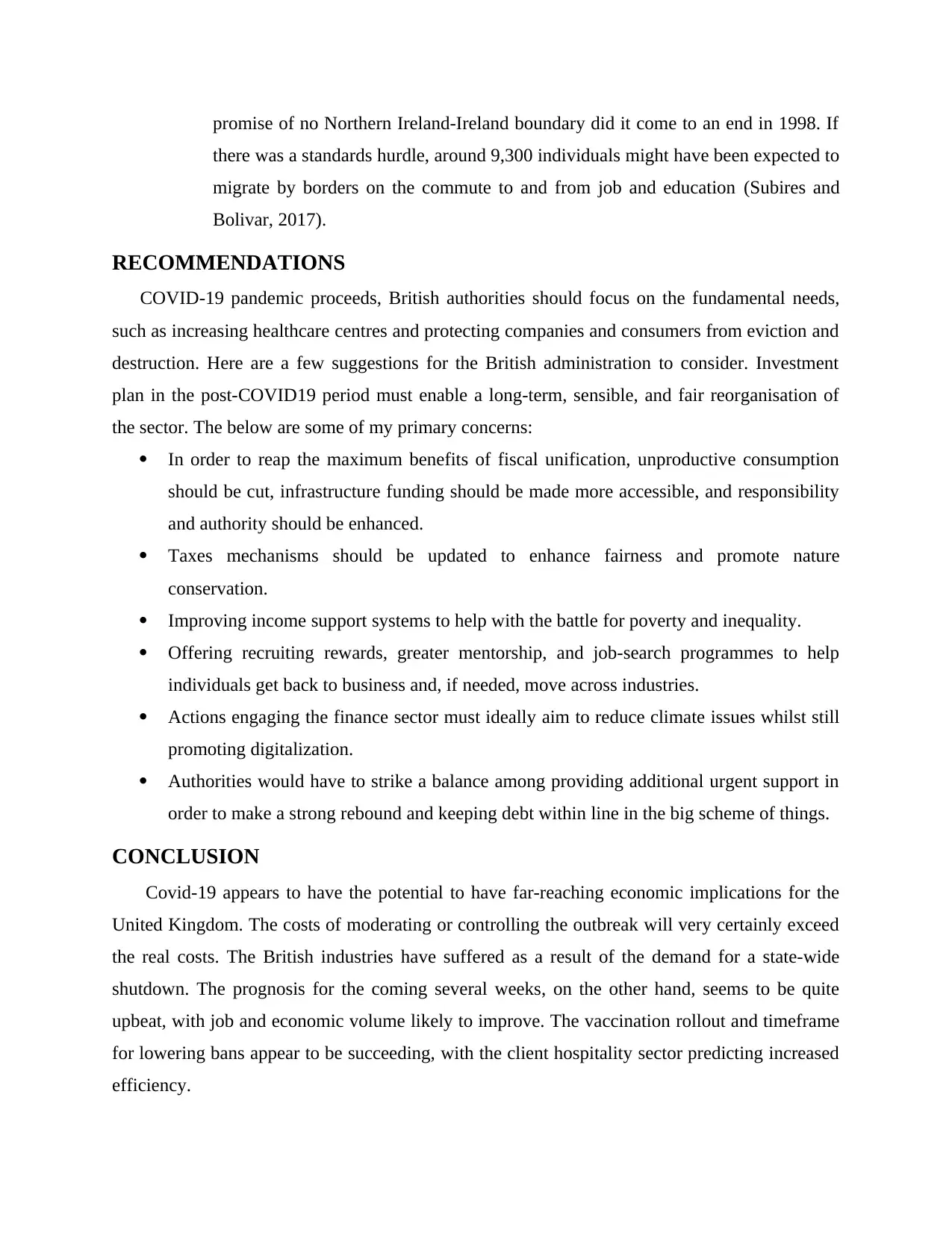
promise of no Northern Ireland-Ireland boundary did it come to an end in 1998. If
there was a standards hurdle, around 9,300 individuals might have been expected to
migrate by borders on the commute to and from job and education (Subires and
Bolivar, 2017).
RECOMMENDATIONS
COVID-19 pandemic proceeds, British authorities should focus on the fundamental needs,
such as increasing healthcare centres and protecting companies and consumers from eviction and
destruction. Here are a few suggestions for the British administration to consider. Investment
plan in the post-COVID19 period must enable a long-term, sensible, and fair reorganisation of
the sector. The below are some of my primary concerns:
In order to reap the maximum benefits of fiscal unification, unproductive consumption
should be cut, infrastructure funding should be made more accessible, and responsibility
and authority should be enhanced.
Taxes mechanisms should be updated to enhance fairness and promote nature
conservation.
Improving income support systems to help with the battle for poverty and inequality.
Offering recruiting rewards, greater mentorship, and job-search programmes to help
individuals get back to business and, if needed, move across industries.
Actions engaging the finance sector must ideally aim to reduce climate issues whilst still
promoting digitalization.
Authorities would have to strike a balance among providing additional urgent support in
order to make a strong rebound and keeping debt within line in the big scheme of things.
CONCLUSION
Covid-19 appears to have the potential to have far-reaching economic implications for the
United Kingdom. The costs of moderating or controlling the outbreak will very certainly exceed
the real costs. The British industries have suffered as a result of the demand for a state-wide
shutdown. The prognosis for the coming several weeks, on the other hand, seems to be quite
upbeat, with job and economic volume likely to improve. The vaccination rollout and timeframe
for lowering bans appear to be succeeding, with the client hospitality sector predicting increased
efficiency.
there was a standards hurdle, around 9,300 individuals might have been expected to
migrate by borders on the commute to and from job and education (Subires and
Bolivar, 2017).
RECOMMENDATIONS
COVID-19 pandemic proceeds, British authorities should focus on the fundamental needs,
such as increasing healthcare centres and protecting companies and consumers from eviction and
destruction. Here are a few suggestions for the British administration to consider. Investment
plan in the post-COVID19 period must enable a long-term, sensible, and fair reorganisation of
the sector. The below are some of my primary concerns:
In order to reap the maximum benefits of fiscal unification, unproductive consumption
should be cut, infrastructure funding should be made more accessible, and responsibility
and authority should be enhanced.
Taxes mechanisms should be updated to enhance fairness and promote nature
conservation.
Improving income support systems to help with the battle for poverty and inequality.
Offering recruiting rewards, greater mentorship, and job-search programmes to help
individuals get back to business and, if needed, move across industries.
Actions engaging the finance sector must ideally aim to reduce climate issues whilst still
promoting digitalization.
Authorities would have to strike a balance among providing additional urgent support in
order to make a strong rebound and keeping debt within line in the big scheme of things.
CONCLUSION
Covid-19 appears to have the potential to have far-reaching economic implications for the
United Kingdom. The costs of moderating or controlling the outbreak will very certainly exceed
the real costs. The British industries have suffered as a result of the demand for a state-wide
shutdown. The prognosis for the coming several weeks, on the other hand, seems to be quite
upbeat, with job and economic volume likely to improve. The vaccination rollout and timeframe
for lowering bans appear to be succeeding, with the client hospitality sector predicting increased
efficiency.
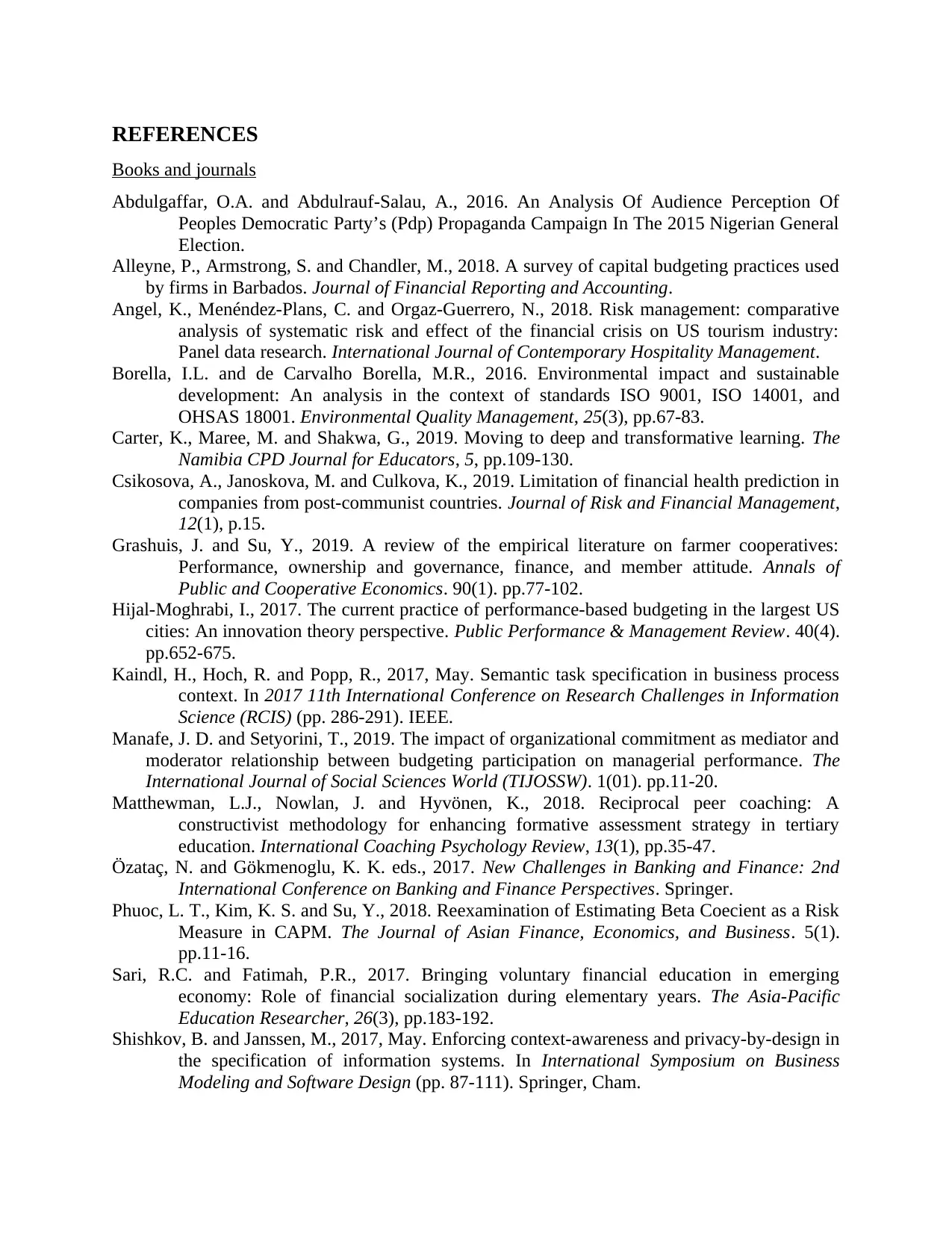
REFERENCES
Books and journals
Abdulgaffar, O.A. and Abdulrauf-Salau, A., 2016. An Analysis Of Audience Perception Of
Peoples Democratic Party’s (Pdp) Propaganda Campaign In The 2015 Nigerian General
Election.
Alleyne, P., Armstrong, S. and Chandler, M., 2018. A survey of capital budgeting practices used
by firms in Barbados. Journal of Financial Reporting and Accounting.
Angel, K., Menéndez-Plans, C. and Orgaz-Guerrero, N., 2018. Risk management: comparative
analysis of systematic risk and effect of the financial crisis on US tourism industry:
Panel data research. International Journal of Contemporary Hospitality Management.
Borella, I.L. and de Carvalho Borella, M.R., 2016. Environmental impact and sustainable
development: An analysis in the context of standards ISO 9001, ISO 14001, and
OHSAS 18001. Environmental Quality Management, 25(3), pp.67-83.
Carter, K., Maree, M. and Shakwa, G., 2019. Moving to deep and transformative learning. The
Namibia CPD Journal for Educators, 5, pp.109-130.
Csikosova, A., Janoskova, M. and Culkova, K., 2019. Limitation of financial health prediction in
companies from post-communist countries. Journal of Risk and Financial Management,
12(1), p.15.
Grashuis, J. and Su, Y., 2019. A review of the empirical literature on farmer cooperatives:
Performance, ownership and governance, finance, and member attitude. Annals of
Public and Cooperative Economics. 90(1). pp.77-102.
Hijal-Moghrabi, I., 2017. The current practice of performance-based budgeting in the largest US
cities: An innovation theory perspective. Public Performance & Management Review. 40(4).
pp.652-675.
Kaindl, H., Hoch, R. and Popp, R., 2017, May. Semantic task specification in business process
context. In 2017 11th International Conference on Research Challenges in Information
Science (RCIS) (pp. 286-291). IEEE.
Manafe, J. D. and Setyorini, T., 2019. The impact of organizational commitment as mediator and
moderator relationship between budgeting participation on managerial performance. The
International Journal of Social Sciences World (TIJOSSW). 1(01). pp.11-20.
Matthewman, L.J., Nowlan, J. and Hyvönen, K., 2018. Reciprocal peer coaching: A
constructivist methodology for enhancing formative assessment strategy in tertiary
education. International Coaching Psychology Review, 13(1), pp.35-47.
Özataç, N. and Gökmenoglu, K. K. eds., 2017. New Challenges in Banking and Finance: 2nd
International Conference on Banking and Finance Perspectives. Springer.
Phuoc, L. T., Kim, K. S. and Su, Y., 2018. Reexamination of Estimating Beta Coecient as a Risk
Measure in CAPM. The Journal of Asian Finance, Economics, and Business. 5(1).
pp.11-16.
Sari, R.C. and Fatimah, P.R., 2017. Bringing voluntary financial education in emerging
economy: Role of financial socialization during elementary years. The Asia-Pacific
Education Researcher, 26(3), pp.183-192.
Shishkov, B. and Janssen, M., 2017, May. Enforcing context-awareness and privacy-by-design in
the specification of information systems. In International Symposium on Business
Modeling and Software Design (pp. 87-111). Springer, Cham.
Books and journals
Abdulgaffar, O.A. and Abdulrauf-Salau, A., 2016. An Analysis Of Audience Perception Of
Peoples Democratic Party’s (Pdp) Propaganda Campaign In The 2015 Nigerian General
Election.
Alleyne, P., Armstrong, S. and Chandler, M., 2018. A survey of capital budgeting practices used
by firms in Barbados. Journal of Financial Reporting and Accounting.
Angel, K., Menéndez-Plans, C. and Orgaz-Guerrero, N., 2018. Risk management: comparative
analysis of systematic risk and effect of the financial crisis on US tourism industry:
Panel data research. International Journal of Contemporary Hospitality Management.
Borella, I.L. and de Carvalho Borella, M.R., 2016. Environmental impact and sustainable
development: An analysis in the context of standards ISO 9001, ISO 14001, and
OHSAS 18001. Environmental Quality Management, 25(3), pp.67-83.
Carter, K., Maree, M. and Shakwa, G., 2019. Moving to deep and transformative learning. The
Namibia CPD Journal for Educators, 5, pp.109-130.
Csikosova, A., Janoskova, M. and Culkova, K., 2019. Limitation of financial health prediction in
companies from post-communist countries. Journal of Risk and Financial Management,
12(1), p.15.
Grashuis, J. and Su, Y., 2019. A review of the empirical literature on farmer cooperatives:
Performance, ownership and governance, finance, and member attitude. Annals of
Public and Cooperative Economics. 90(1). pp.77-102.
Hijal-Moghrabi, I., 2017. The current practice of performance-based budgeting in the largest US
cities: An innovation theory perspective. Public Performance & Management Review. 40(4).
pp.652-675.
Kaindl, H., Hoch, R. and Popp, R., 2017, May. Semantic task specification in business process
context. In 2017 11th International Conference on Research Challenges in Information
Science (RCIS) (pp. 286-291). IEEE.
Manafe, J. D. and Setyorini, T., 2019. The impact of organizational commitment as mediator and
moderator relationship between budgeting participation on managerial performance. The
International Journal of Social Sciences World (TIJOSSW). 1(01). pp.11-20.
Matthewman, L.J., Nowlan, J. and Hyvönen, K., 2018. Reciprocal peer coaching: A
constructivist methodology for enhancing formative assessment strategy in tertiary
education. International Coaching Psychology Review, 13(1), pp.35-47.
Özataç, N. and Gökmenoglu, K. K. eds., 2017. New Challenges in Banking and Finance: 2nd
International Conference on Banking and Finance Perspectives. Springer.
Phuoc, L. T., Kim, K. S. and Su, Y., 2018. Reexamination of Estimating Beta Coecient as a Risk
Measure in CAPM. The Journal of Asian Finance, Economics, and Business. 5(1).
pp.11-16.
Sari, R.C. and Fatimah, P.R., 2017. Bringing voluntary financial education in emerging
economy: Role of financial socialization during elementary years. The Asia-Pacific
Education Researcher, 26(3), pp.183-192.
Shishkov, B. and Janssen, M., 2017, May. Enforcing context-awareness and privacy-by-design in
the specification of information systems. In International Symposium on Business
Modeling and Software Design (pp. 87-111). Springer, Cham.
⊘ This is a preview!⊘
Do you want full access?
Subscribe today to unlock all pages.

Trusted by 1+ million students worldwide
1 out of 13
Related Documents
Your All-in-One AI-Powered Toolkit for Academic Success.
+13062052269
info@desklib.com
Available 24*7 on WhatsApp / Email
![[object Object]](/_next/static/media/star-bottom.7253800d.svg)
Unlock your academic potential
Copyright © 2020–2026 A2Z Services. All Rights Reserved. Developed and managed by ZUCOL.




